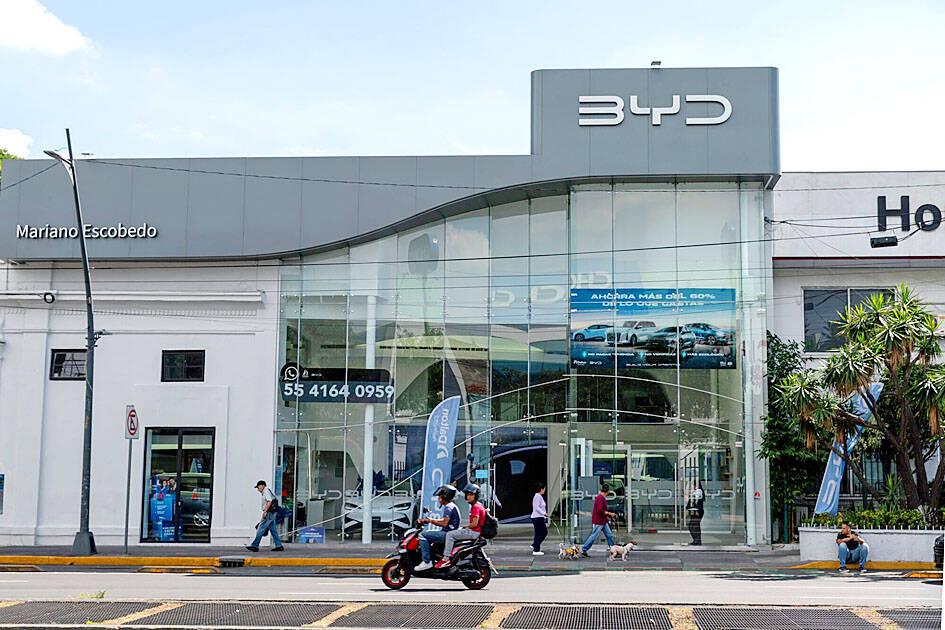China urged Mexico to “think twice” before levying tariffs, a warning that could signal Beijing’s willingness to retaliate over a move it sees as giving into demands from the US.
“Any unilateral tariff increase by Mexico, even within the framework of WTO rules, would be seen as appeasement and compromise toward unilateral bullying,” a Chinese Ministry of Commerce spokesperson said in a statement on Thursday. “We urge the Mexican side to exercise extreme caution and consider carefully before taking any actions.”
Mexico has come under growing pressure from US President Donald Trump’s stance on trade, particularly his push for steep tariffs on Chinese goods.

Photo: Bloomberg
The Latin American nation on Thursday announced plans to impose duties of as much as 50 percent on cars and other products made by China and several Asian exporters.
Mexican President Claudia Sheinbaum, who is preparing for talks over North America’s free-trade deal, later said that she is not seeking conflict with China, but instead wants to protect domestic industry.
China’s exports to Mexico have nearly doubled since 2016, the year before Trump started his first term in office, in part because Chinese companies moved operations there to avoid US tariffs, but it is become increasingly difficult for nations caught in the middle between Washington and Beijing to navigate bilateral relationships with the two superpowers as the US president pushes trading partners to increase levies on China.
“Beijing will likely hit back with reciprocal tariffs immediately, but risks alienating partners at a time when it critically needs allies. Over time, it may also encourage firms to localize production in partner countries, though that would come at the cost of weaker output and jobs at home,” Bloomberg Economics said.
China runs a substantial trade surplus with Mexico. Last year it exported US$71 billion more than it imported, Chinese customs data showed.
Mexico accounted for about 5 percent of China’s copper ore imports in January to July, as the Asian nation’s smelters try to secure every tonne of raw material they can in a tight global market.
While copper ore and concentrates could be a potential target for retaliation, Mexico would likely be able to find other customers given strong demand for the metal essential for the renewable energy industry.
The biggest producer of copper in Mexico is US-based Southern Copper Corp, a part of Mexican billionaire German Larrea’s Grupo Mexico.
The Chinese Ministry of Commerce spokesperson urged nations to strengthen communication and coordination “amid widespread global opposition to indiscriminate imposition of tariffs from the US,” adding that China would take necessary measures to safeguard its rights and interests.

NEW IDENTITY: Known for its software, India has expanded into hardware, with its semiconductor industry growing from US$38bn in 2023 to US$45bn to US$50bn India on Saturday inaugurated its first semiconductor assembly and test facility, a milestone in the government’s push to reduce dependence on foreign chipmakers and stake a claim in a sector dominated by China. Indian Prime Minister Narendra Modi opened US firm Micron Technology Inc’s semiconductor assembly, test and packaging unit in his home state of Gujarat, hailing the “dawn of a new era” for India’s technology ambitions. “When young Indians look back in the future, they will see this decade as the turning point in our tech future,” Modi told the event, which was broadcast on his YouTube channel. The plant would convert

‘SEISMIC SHIFT’: The researcher forecast there would be about 1.1 billion mobile shipments this year, down from 1.26 billion the prior year and erasing years of gains The global smartphone market is expected to contract 12.9 percent this year due to the unprecedented memorychip shortage, marking “a crisis like no other,” researcher International Data Corp (IDC) said. The new forecast, a dramatic revision down from earlier estimates, gives the latest accounting of the ongoing memory crunch that is affecting every corner of the electronics industry. The demand for advanced memory to power artificial intelligence (AI) tasks has drained global supply until well into next year and jeopardizes the business model of many smartphone makers. IDC forecast about 1.1 billion mobile shipments this year, down from 1.26 billion the prior

People stand in a Pokemon store in Tokyo on Thursday. One of the world highest-grossing franchises is celebrated its 30th anniversary yesterday.

Zimbabwe’s ban on raw lithium exports is forcing Chinese miners to rethink their strategy, speeding up plans to process the metal locally instead of shipping it to China’s vast rechargeable battery industry. The country is Africa’s largest lithium producer and has one of the world’s largest reserves, according to the US Geological Survey (USGS). Zimbabwe already banned the export of lithium ore in 2022 and last year announced it would halt exports of lithium concentrates from January next year. However, on Wednesday it imposed the ban with immediate effect, leaving unclear what the lithium mining sector would do in the